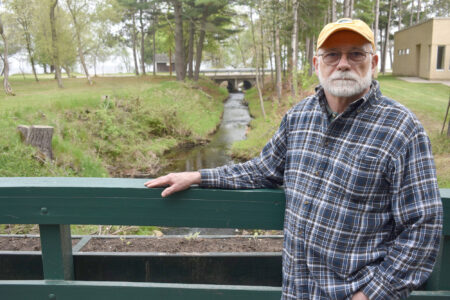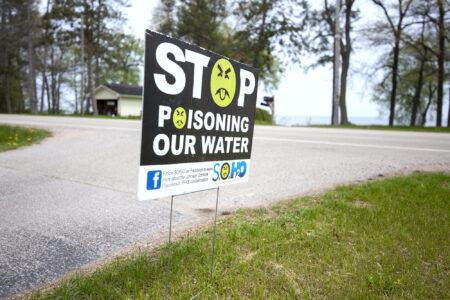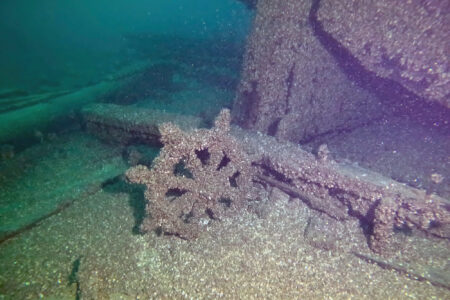Marinette, Peshtigo residents frustrated with pace of PFAS cleanup
- Marinette City Council member Doug Oitzinger stands over a ditch flowing into Green Bay, where water samples have shown PFOS levels as high as 2,000 parts per trillion before it’s treated. (Danielle Kaeding/Wisconsin Public Radio)
- A yard sign in Marinette, Wis., in May 2021. (Angela Major/Wisconsin Public Radio)
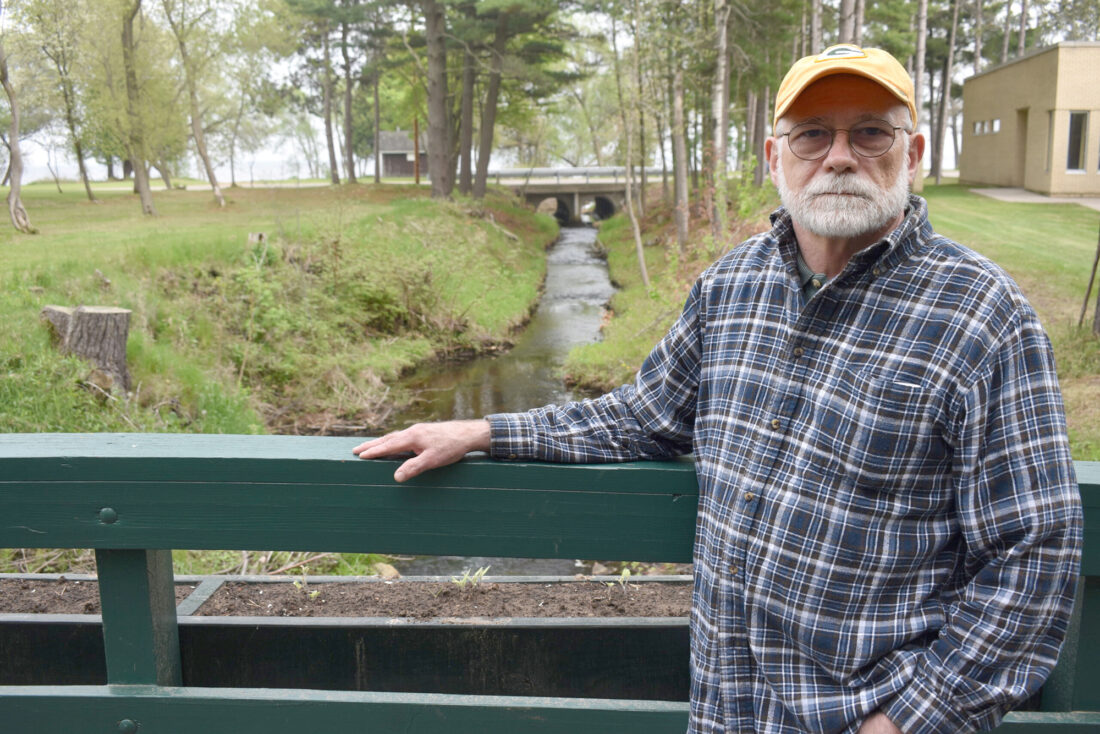
Marinette City Council member Doug Oitzinger stands over a ditch flowing into Green Bay, where water samples have shown PFOS levels as high as 2,000 parts per trillion before it’s treated. (Danielle Kaeding/Wisconsin Public Radio)
More than 1.8 billion gallons of water has been treated to remove PFAS stemming from a Marinette manufacturer of firefighting foam, but efforts remain ongoing to reduce groundwater contamination amid a political standoff in Madison over addressing PFAS.
In a Thursday listening session, the Wisconsin Department of Natural Resources said progress has been made to reduce PFAS coming from Tyco Fire Products’ fire training facility in Marinette. For decades, the facility used firefighting foam containing the chemicals, contaminating groundwater and nearby private wells.
Tyco and its parent company, Johnson Controls International, have been treating water in nearby creeks and groundwater at the Marinette facility, removing 35 pounds of the chemicals. Since 2022, Tyco’s groundwater extraction and treatment system has pumped and treated about 300 million gallons of groundwater, according to Alyssa Sellwood, the DNR’s project manager and water resources engineer.
Treatment has reduced PFAS levels in water discharged to a nearby creek from as high as 10,000 parts per trillion, or 2,500 times greater than the federal drinking water standard, to almost zero. But that only represents a portion of the groundwater present.
“There is progress,” Sellwood told WPR. “From a big picture, from a groundwater standpoint, we’re not seeing significant changes in the groundwater itself, and we wouldn’t expect to. It’s a really long, slow process.”
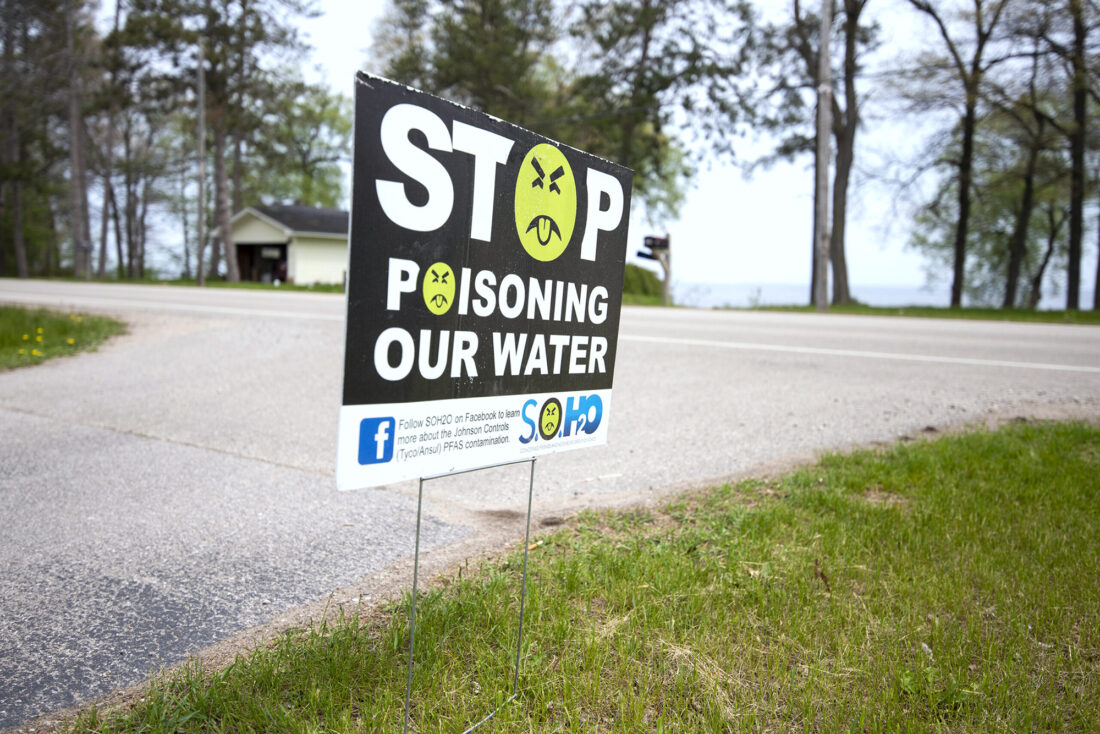
A yard sign in Marinette, Wis., in May 2021. (Angela Major/Wisconsin Public Radio)
Other treatment systems have reduced PFAS levels in creeks that flow into the Bay of Green Bay from thousands to hundreds of parts per trillion. Even so, Doug Oitzinger, former Marinette mayor and current city council member, noted it won’t completely eliminate PFAS in groundwater.
“It’s not returning the groundwater to what it was before it got contaminated,” he said.
In the meantime, 236 of 776 wells sampled by either Tyco or the DNR have PFAS levels that go beyond state health advisory levels for groundwater, which were updated to reflect federal drinking water standards enacted last year. Tyco sampled about 170 wells surrounding its facility.
In a statement, Tyco said it has spent $100 million to address PFAS contamination, and the company has seen a 40 percent reduction in the area with highest PFAS levels.
“Tyco has also provided clean drinking water to everyone in the impacted area: 141 neighbors of 169 asked us for a new deep well, and we’ve made 133 of them happen to date,” a Tyco spokesperson said, referring to wells drilled into a deep aquifer to avoid PFAS.
Even so, Tyco has refused to address contamination in an expanded area around its facility, saying other parties are responsible. The state has filed two lawsuits against the company to recover costs from cleaning up PFAS and for failing to immediately notify regulators of contamination.
Residents voiced frustration with PFAS legislation that they say protects corporate polluters, as well as a lack of action on setting groundwater standards for the chemicals.
Town of Peshtigo resident Cindy Boyle said standards would force polluters to clean up contamination to a certain threshold, noting PFAS limits are lacking for those who rely on private wells that draw from groundwater.
Boyle, former chair of the town board, added that communities are unable to tap $125 million set aside to address PFAS contamination because Republican lawmakers and Gov. Tony Evers are at odds over distributing those funds.
“It sounds like the Legislature wants to provide more oversight and control and maybe create new distribution methods for those funds. I don’t see the purpose in reinventing the wheel,” Boyle told WPR. “I think that it should be released immediately and put to work.”
Political impasse on PFAS holds up funds for communities
At the hearing, State Senate President Mary Felzkowski, R-Tomahawk, noted that Evers vetoed a Republican bill last year that set a framework for spending those funds. She said Sen. Eric Wimberger, R-Oconto, and Rep. Jeff Mursau, R-Crivitz, are spearheading legislation to address PFAS this year.
“Right now, they’re in negotiations with Gov. Evers so we don’t go through the veto process again,” Felzkowski said.
Evers spokesperson Britt Cudaback disputed that. She said Wimberger has refused “meaningful and productive” conversations around PFAS.
“Instead, and despite Gov. Evers’ and our administration’s repeated efforts to reach compromise with Republican lawmakers, including Sen. Wimberger, Sen. Wimberger instead decided to go it alone again this session and he is continuing to advance legislation containing the same harmful provisions as last session, which Gov. Evers previously vetoed and without trying to compromise or change anything to reach bipartisan consensus,” Cudaback said.
Bills introduced by Wimberger and Mursau would create grant programs to address PFAS contamination and exempt certain individuals and facilities often referred to as “innocent landowners” from being forced to clean up PFAS under the spills law.
The dispute over releasing the funds largely centers around defining who counts as an innocent landowner. When Evers vetoed PFAS legislation last year, he said it would let polluters off the hook.
“The Governor’s veto delayed the resources and protections that we approved more than two years ago, but I think he now understands that victims of pollution shouldn’t be on the hook for pollution they didn’t cause,” Wimberger said in a statement.
In his budget, Evers proposed exempting residents and farmers from being held financially responsible for cleaning up PFAS under the state’s spills law. That measure was removed before the final budget was passed.
In the meantime, residents like Boyle said she’s convinced elected leaders will bridge the divide to find a solution.
“PFAS is a bipartisan issue. It doesn’t discriminate on who it chooses to poison,” Boyle said. “Hopefully, we will be able to find progress with less political division sooner than later.”

